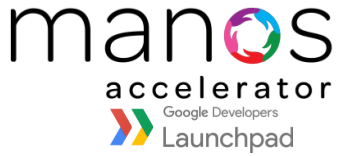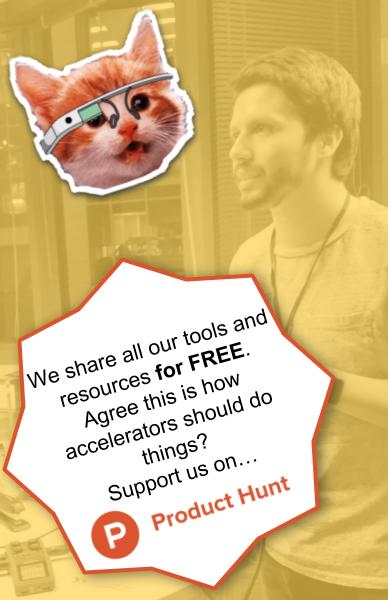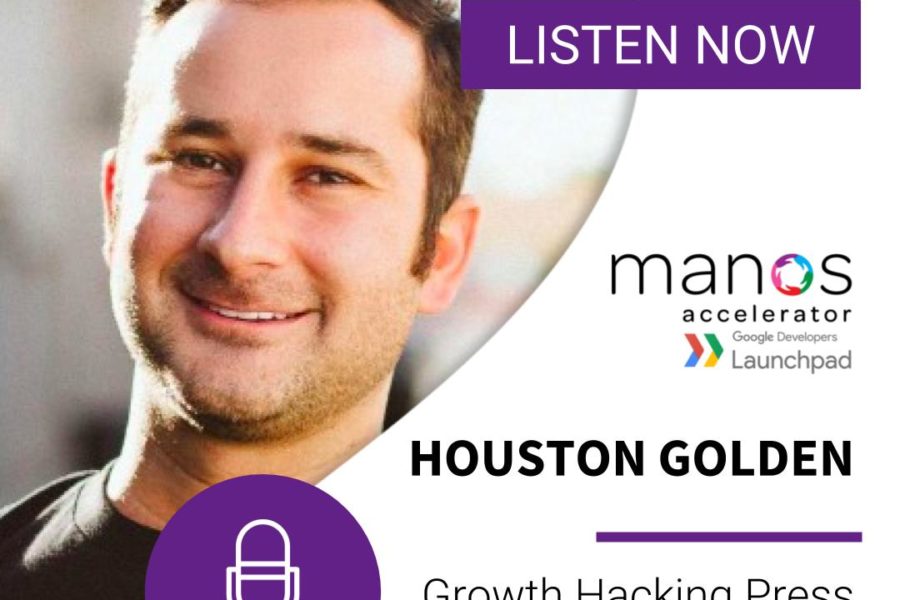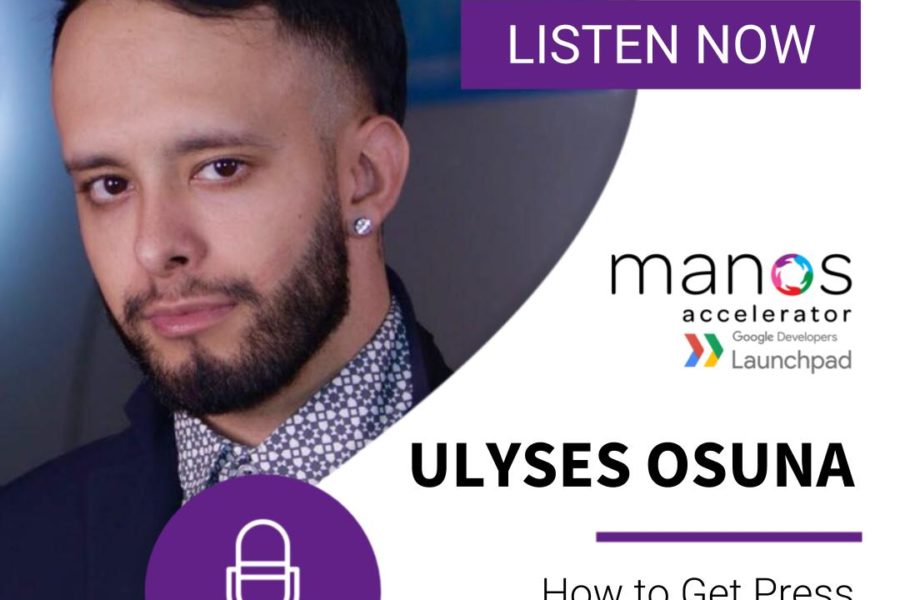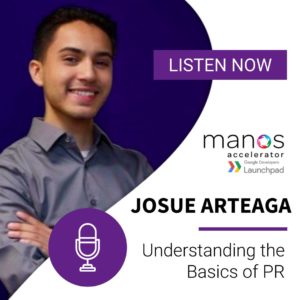 Josue Arteaga is the founder of Influencer Viral and Head of Operations of Influencer Press. He’s a growth hacking guru, digital marketing expert, and superstar entrepreneur.
Josue Arteaga is the founder of Influencer Viral and Head of Operations of Influencer Press. He’s a growth hacking guru, digital marketing expert, and superstar entrepreneur.
Josue has helped celebrities, influencers, and mega brands growth hack their personal or company brand by getting them featured on the worlds biggest publications like Forbes, Inc, Entrepreneur Magazine & many more.
SUBSCRIBE
Show Notes
You are listening to the Manos Accelerator podcast in partnership with Google Launchpad. We interview rockstar entrepreneurs who share their exact formulas for success in customer acquisition, growth hacking, fundraising or scaling. And I’m your host, Juan Felipe Campos. Okay, Manos Nation! Remember for every episode there’s a giveaway of digital goods or resources from our partners that other people would normally pay for it. To enter the giveaway, subscribe to the podcast on iTunes now and then message the word “Manos” to m.me/ManosAccelerator. Again, that’s Manos to the website, m.me/ManosAccelerator. To prove it.
Juan: 00:48 And today I’m here with my guest Josue Arteaga. Who is a PR rockstar. He’s going to walk us through how to go from zero to PR. Thank you so much for coming on the show Josue.
Josue: 00:59 Yeah, no problem. I’m honored that you brought me on and I’m super happy to be here and share my knowledge.
Juan: 01:05 Of course. So a lot of our listeners, they are tech founders, their tech entrepreneurs and so they really believe in the power of PR and the perception that someone can have before they even start doing business with him, you know, just because of that social proof. Can you walk us through the steps? Somebody that’s has no PR experience, no PR background on how they can go from zero to having their first article go up and then start snowballing from there.
Josue: 01:29 Okay. So one of the tactics I use on not just companies but also just people in general, like entrepreneurs when they have no press is that we go straight to the small press. So there’s a lot of small publications and blogs out there that are credible or in the business tech scene and are very easy to get onto.
Josue: 01:49 And so the reason why I would recommend starting on those is because you could control your truth on there. So if your company is really good at doing a specific thing, you can get on those small publications and get coverage on those specific things right off the bat. So then like, because if you try to get on Forbes right away, Forbes actually they’re very tough and these guys, you know they everybody wants to get coverage from them. So they’ll, they’ll be able to tell you like, no, you can’t do that or yes you can do this or like do you know they kind of can control what you want to see on there or like their editors and stuff. So it’s just a hassle. But on the smaller publications, so like just to name a few, Future Sharks, Buzzfeed Community, on Mongo, which is actually a site for like women in the tech space I guess, but they’re still really good to be able to get onto those small publications and you like have someone write about your business or even there, it’s super easy to get a contributor status on them and then have someone in the company write about the business or maybe have a freelancer write about the business.
Josue: 02:57 Then that way you’re able to tell your the way you want it and then once you have those 10, 12 pieces all about you and there is. There’s thousands of small publications out there, so finding them is not hard. I’m one of the ways I’ve found is when I go on Fiverr, you can look up some small publications just putting on their press or publication. A bunch of results will come up on Upwork is another way to sell. There’s a lot of freelancers that have just, you know, I think maybe you’ve seen them, uh, maybe some of the entrepreneurs or, some of the tech founders here, I’ve seen them, but they just have lists and lists of all these small publications they’re selling for like 100 bucks, 15 bucks. Um the price ranges all the way to like 500 bucks. That’s all small really small publications that you could get on, control your story.
Josue: 03:44 And then once you go into the Forbes Inc entrepreneur, you send them those stories and they are. And that’s the thing they’re going to cover you on because that’s the only thing you have coverage on. Does that make sense?
Juan: 03:55 Right. Totally. So actually I think we as at Manos Accelerator have put together the largest list of this kind in the world. It’s over 2,190 guest blogging opportunities, what Josue’s talking about is basically making your own luck instead of relying on finding the shortcuts to how someone else can write about you. If you’re able to become a contributor for one of these platforms or submit an article that gets published, now you can start stacking trophies and then okay, you already have the main piece that you needed. Now you can send that as part of a pitch to a bigger one in the bigger one and you don’t have as many of the gatekeepers of like a Forbes or an inc saying you can’t be that specific about what you right. You can’t be that specific about your company. You’re mentioning it too much. You’re not linking out enough. There’s all this red tape and some of the smaller publications, very oftentimes you don’t have as much of that red tape because they just need the content for SEO, for whatever. So like, go ahead, write about yourself, right about your trophies. That’s fine. Now you can then pitch it. So we’ve done that. Let’s say we, um, and by the way, this will be linked to in the show notes, 2,190 guest blogging opportunities so that you can create your own luck. Once you’ve done that, you have your first article. How do you then start snowballing into other people writing about you?
Josue: 05:04 Yeah. So the way you wanted to go about it. So once you have all those small publications and then you want to go into the bigger publications will personally works for me is that it’s not about how many editors you pitch it’s about how many relationships that you develop and how deep they go. So as a tech founder, I’m. One of the things I would always do like with another Forbes contributor in contributing is that first I will just introduce myself, let them know that I do press for other people and then offer to do press for them for free. And the reason why I know a lot of people maybe will not go that route. Um, and no, I wouldn’t, I would never like barter or thing. I’ll just offer them that value so they know who I am. And then later on down the relationship, I’ll just ask him as a friend, like, hey, um, you know, what, what kind of pieces are you working on? Oh, okay. Like I have this client. Do you think he makes a great fit? And be like, Oh yeah, he a great fit. Because it’s all about who you know in PR is.
Josue: 06:00 It really is about who you know, if you know the person who controls, who gets on the, like the cover of Time magazine and your buddy buddies with them, you, you could like, you know, that’s a PR agency in itself right there. You can charge tens of thousands of dollars to get on the cover of Time magazine or something. So when you, when it comes into this bigger publications, it’s about developing the relationships. And so, and the reason the smaller publications are essential is because once they pitch you, the editors actually want to know who you are. And that’s when that small little, all those small press pieces come into play. Because no Forbes does not want to be the first person to cover your tech company. They don’t want to be the first person, so once they see that whole like line up and then the editor has your back, it’s just that nice like cushion and then you get into those publications with ease. You get that one that you get the two, you get the three a Forbes, uh, articles or whatnot, and then it just snowballs from there. You’re easily able to get into all these publications because then you’re starting to be known as, you know, that tech company in that space for that specific product or whatever it may be. So that’s pretty much it.
Juan: 07:08 And so that’s really interesting. What we’re talking about here is that relationship building. We launched a list of the contact information of over 4,800 press journalists that were interested in writing on the tech space, and what a lot of people did, was abuse that list and just go like full blown like message everybody. And it’s nothing but a right hook. It’s anything but, hey, will you write about me? Here’s the pitch. And what we found was that, um, you know, if you’re a press journalist of any sort, you’re constantly being bombarded by stories.
Josue: 07:37 So when people only send you a pitch, you’re of course not going to stand out. This is one out of a thousand and people are constantly asking of you. And what’s worked really well is to actually see it much more as what it is, which is basically a relationship. These are people that have their own aspirations, their own career goals. And if you’re able to understand their love language and what they’re looking to do selfishly, you know, let’s just call it what it is they’re looking to either scale or grow their brand, grow their Instagram, they get more Twitter followers, like whatever that is. And you’re able to position yourself as the source of that thing that they’re looking to do. Then you can now scale the relationship and it’s more about having 10 people that are in your corner that write for big publications than it is about pitching a thousand people right?
Josue: 08:14 Definitely because one, one, two, three good people can lead to open doors to like the rest of them. So that’s really what it comes down to is just helping out and giving value to those specific people you want to work with. Um, you know, like let’s say I landed a client 10 years, gets a super big client. Um, but the way I had landed him as a client is I first, I let him know what it was like to work with us. So I gave him a lot of free press, uh, did a lot of free work. And so once I got that, then he brought me all the other influencers. And so that same concept applies to contributors. Um, once you get one of them, you, they know who you are, they a, like this guy, he’s super awesome, like, you know, maybe cover him too or they just start giving back. The universe gives back if you give to it first.
”One of the tactics I use on not just companies but also just people in general, like entrepreneurs when they have no press is that we go straight to the small press. So there’s a lot of small publications and blogs out there that are credible or in the business tech scene and are very easy to get onto.
Josue ArteagaFounder of Influencer Viral
Juan: 09:04 Right right, no I still believe in that. So Josue set some expectations here because a lot of people are like, okay, I get how to reach out to the contributors. I understand that I have to build a relationship with them. I’m going to be looking at the resources, which by the way are in the Facebook group, Latino Founder Network. It’s the Manos Accelerator Facebook group and you can access all these resources so they’re onboard. Let’s set some expectations about what press is and isn’t you use it a lot for building that leverage on high ticket items so that when people check out the website and they see that you’ve been on these major publications, they’re more willing to make a purchase, but it’s. I’m under the impression right now that about let’s say 90 percent of the $100 million website visitors that Forbes gets a month. Ninety percent of those goes to like, I dunno, 10 articles or 20 articles, something like that, and the bulk of the publication actually ends up getting very few viewers, so we can’t look at these articles as like mass sources of traffic or mass sources of SEO. So that’s the wrong expectation. Right. That is a little bit through, okay, so I get an article. What does that mean for my career? Am I going to see a bunch of purchases? Is it SEO juice? What is it? What isn’t it?
Josue: 10:06 So, so like let’s say a of a feature on Forbes. So press is never used for traffic. You want traffic, cost per clicks, um go into that field. But what press is really good for is just for that authority and credibility. So if your company wants to be known as like the best software for Facebook ads than you on that press can put yourself as the best, you know, in that, you know, Facebook software place for that specific reason. So, so let me, let me put it in terms of personal branding and then, you know, like you guys could kind of put it into the tech space, um, because I don’t know much like about what certain tech companies do.
Juan: 10:48 It’s a different world.
Josue: 10:49 Yeah, it’s a different world. But so like for example, myself, let’s say I’m, I’m actually starting to another publication, my own publication. And so I don’t want to talk about the name or anything because it’s top secret right now. But for example, that that publication, um, if I get press as a founder of that publication, I would go something along the line as the founder that built the most trustworthy, you know, publication. So then when people see the publication, they know if it’s trustworthy or like, you know, that. So when you’re coming in as a tech company, um, that, that’s what it’s used for is to, like, so when visitors come onto your site and they see your press, they see what other people are saying about you.
Josue: 11:32 So actually, let’s put it this way, I think this is very simple, um, what press is basically for 10 companies, what it means. It’s like that word of mouth marketing. So if a company is saying, you know, they give you a good review, they’re saying your product is good on this and that, what you want to use that coverage for is on your own website. So when another visitor comes on, they instantly see, okay, there’ve been on Forbes and they’re on there for good reason. And so that that’s really what it’s used for. And like I know some companies, sell like software programs, so that’s going to give you that extra credibility, that really good first impression for them to go to the add to cart and buy because they know you have that credibility behind you. These publications are saying good things about you.
Josue: 12:15 It’s like if I told you, you know, Burger King’s better than McDonald’s and you never had either of them, you’re going to say like old is better. So like I am that Forbes recommending you this product and when you’re coming onto my site, you’re seeing that I get, I had those recommendations.
Juan: 12:29 Right. Right.
Josue: 12:29 So that’s kind of like, what I’m putting it down as.
Juan: 12:34 It makes perfect sense. So let’s just sum this up and bring it home. We’re basically talking about building deep relationships with, with publishers that can actually write about you. And before doing that, you want to already create your own luck by writing about yourself. So the best way to do that is to do your own research on Google to figure out what websites are accepting contributors. You named some of them, but we even have a list of over 2,800 opportunities that are categorized by different industries, so whether you’re in beauty or health or fitness or you know tech, especially whatever your background is in, you can find publications where you can write about your own company. Then use that to then reach out to your friends. They should be friends by now because you’ve built the relationship, you’ve given the jabs, you’ve given them the opportunity for them to scale in their own careers, and then you can look at how your story can implement into stories that they’re already writing. Once you get that love, once you start getting some of those stories showing up on the Internet, you want to make sure that you’re positioning them in your own website and your own social media so that you’re, again just creating your own luck and not hoping that people find and do enough research. You want to put it front and center. If something good has been said about you on a major publication or even a small one, you want to make sure that it is very intentional about people seeing that in the whole customer journey from your website to this is what someone said to check out.
Josue: 13:45 Yeah.
Juan: 13:47 Josue, I super appreciate your time sharing all these tips.
New Speaker: 13:48 Okay, Manos Nation! Do not forget your chance to win digital goods and resources on every episode right here on the podcast. It’s very simple. You just subscribe to the show on iTunes. Once you’ve done that, message the word “Manos” to m.me/ManosAccelerator. Subscribe on iTunes and then message Manos to the website, m.me/ManosAccelerator. See you on the next one.
Juan: 14:16 As you continue to grow and scale your career, where’s the best place for people to stay in touch with you?
Josue: 14:20 So best place is either Facebook at Josue Arteaga have a little blue badge verified, so you notice me and then another place is just my email at josue@influencerpress.com.
Juan: 14:35 Perfect. Thanks so much for coming on the show.
Josue: 14:36 Yeah, no problem.
Social Media:
- LinkedIn: https://www.linkedin.com/in/josuearteaga/
- Email: josue@influencerpress.com
- Facebook: https://www.facebook.com/josue.arteaga.7

